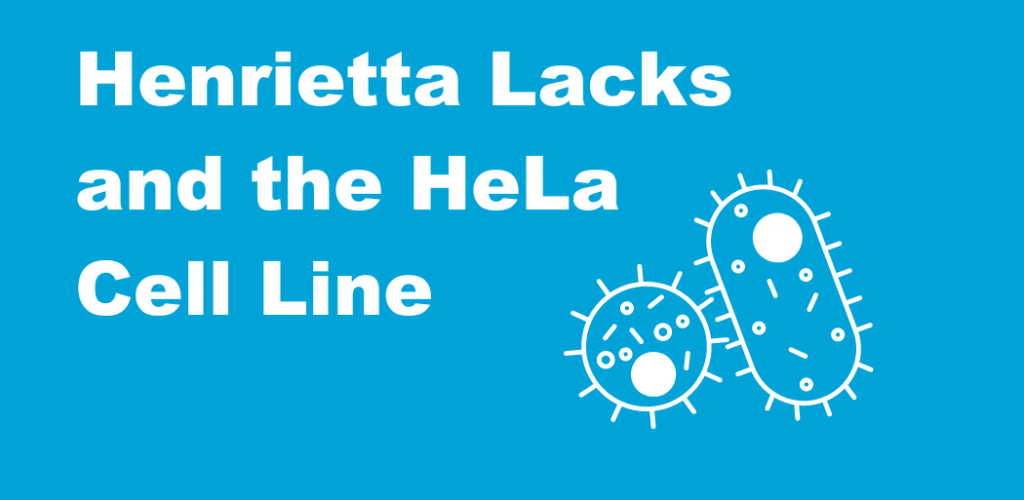

By Teen Health Source
Henrietta Lacks was an African-American woman who was diagnosed with stage I cervical cancer in 1951. She received cancer treatment at John Hopkins Hospital. During her first treatment, her doctor took 2 tissue samples to be used for research. One sample was of cervical tissue that was still healthy, and the other was of cancerous cervical tissue. These samples were taken without Henrietta’s consent. No one asked Henrietta if tissue samples could be taken, and neither was she ever informed that they had been taken. As Henrietta’s cancer continued to spread to other parts of her body, the severity of her symptoms increased. After a months-long hospital stay, she died on October 4, 1951.
George Gey was a doctor and cancer researcher working at John Hopkins Hospital. Gey’s goal was to find the world’s first human immortal cells. Normally, when a tissue sample is collected and grown in a lab setting, the cells eventually die. However, immortal cells don’t die, they keep replicating and growing. Researchers wanted to find a human immortal cell line because it would create an endless supply of cells on which to conduct research, including developing a cure for cancer.
All of the cells that Gey collected eventually died in his lab. Henrietta’s healthy cervical tissue cells also died within a couple of days. But her cancerous cervical tissue cells didn’t. They kept growing and growing, and within hours there were millions of cells. The first human immortal cells had been discovered, and they were named after Henrietta as the ‘’HeLa cell line’’.
Gey gave HeLa cells to other doctors, scientists, researchers, and companies all over the world. All the while, the knowledge that these immortal cells were from Henrietta, was hidden from Henrietta herself, her family, and the public. In the 1970s, some researchers asked the Lacks family for blood samples. Only then – over 20 years after Henrietta’s death – did her family learn what had really happened.
In healthcare, informed consent is the process of obtaining a person’s voluntary consent to conduct a medical task. This involves giving the person sufficient information on why and how the task will be conducted. Informed consent can include getting consent for an examination, diagnostic test, and treatment.
Informed consent is also imperative for the collection of human tissue samples for research. To take a person’s tissue sample and use it in research without consent is highly unethical, as it disregards a person’s right and autonomy to make decisions for themselves. At the time when Henrietta’s cells were taken, there were no regulations or laws that required healthcare providers to obtain informed consent for taking human tissue samples to use in research.
An important aspect of how HeLa cells were discovered and used is the role of race and racism. At the time that Henrietta’s cells were taken, segregation (the discriminatory system of dividing society by race) was still legal in Baltimore where she lived. This meant Black individuals could only use facilities and services designated for their race, and these services were often poorly funded and less accessible than their white-only counterparts.
While John Hopkins Hospital was the only one in Henrietta’s area that treated Black patients, segregation was still present inside of the hospital. Henrietta received care in a ‘’colored ward’’, which only treated Black patients and other areas of the hospital, such as washrooms, operating rooms, exam rooms, and blood collection areas were also segregated.
Since their discovery, HeLa cells have led to some of the biggest advancements in scientific and medical history. It is estimated that there are over 100,000 research publications about HeLa cells. The following are only a few of the studies that have been done with Henrietta’s cells:
While the above lists many positive things that have been accomplished, it is essential to remember they do not mean that it was ever right or acceptable for Henrietta’s cells to be taken without her permission. What happened to Henrietta was an invasion of her privacy and autonomy. When patients are unable to have a say in their treatment, or the use of their DNA, they may be subjected to unwanted medical practices or have their DNA/tissue used in unethical research they would not want to be a part of.
Today, there are many regulations and laws that govern human tissue collection and research use in the U.S. For example,. The Common Rule is a federal policy created in 1981, requiring research studies to get approval from an institutional review board and informed consent from participants. Similarly, the American Medical Association now states that doctors must obtain consent to use a tissue sample in research. By legally requiring informed consent, this ensures that tissue sample collection and research is conducted ethically.
In 2013, the full genome sequence (the exact DNA content) of HeLa cells was discovered and published. This brought up privacy and ethical concerns, as it meant that genetic information about the Lacks family was available for any researcher to freely use. This led to the NIH HeLa Genome Data Use Agreement, a policy that requires researchers to send requests to a committee who decides whether to give access to use the full HeLa genome sequence in research. The committee includes members of the Lacks family, ensuring that the HeLa genome is protected and used in research in a respectful manner.
Similar to the U.S, Canada also has regulations regarding informed medical consent and research. The Tri-council Policy Statement: Ethical Conduct for Research Involving Humans is a federal policy that consists of ethical standards that research studies must meet. Chapter 12 of this policy states that when research uses human biological materials (such as tissue samples), both informed consent from participants and research ethics board approval is needed.
Additionally, the Canadian Medical Association has a Code of Ethics and Professionalism. This Code mandates that all physicians who participate in research must ensure informed consent is voluntarily provided from participants.
While Teen Health Source focuses on information related to sexual health and relationships, we can still suggest resources and further reading if you have more questions, feel free to contact one of our peer educators. [Link]
Last updated: April 2023.

Friends With Benefits relationships can be tricky. Like, what do yo do if you start to have feelings for them? Don’t stress, because this post dives right into the heart of that question!

What *is* the deal with douching? Is it safe? What are the consequences of douching for your body?

Volunteer with Teen Health Source!